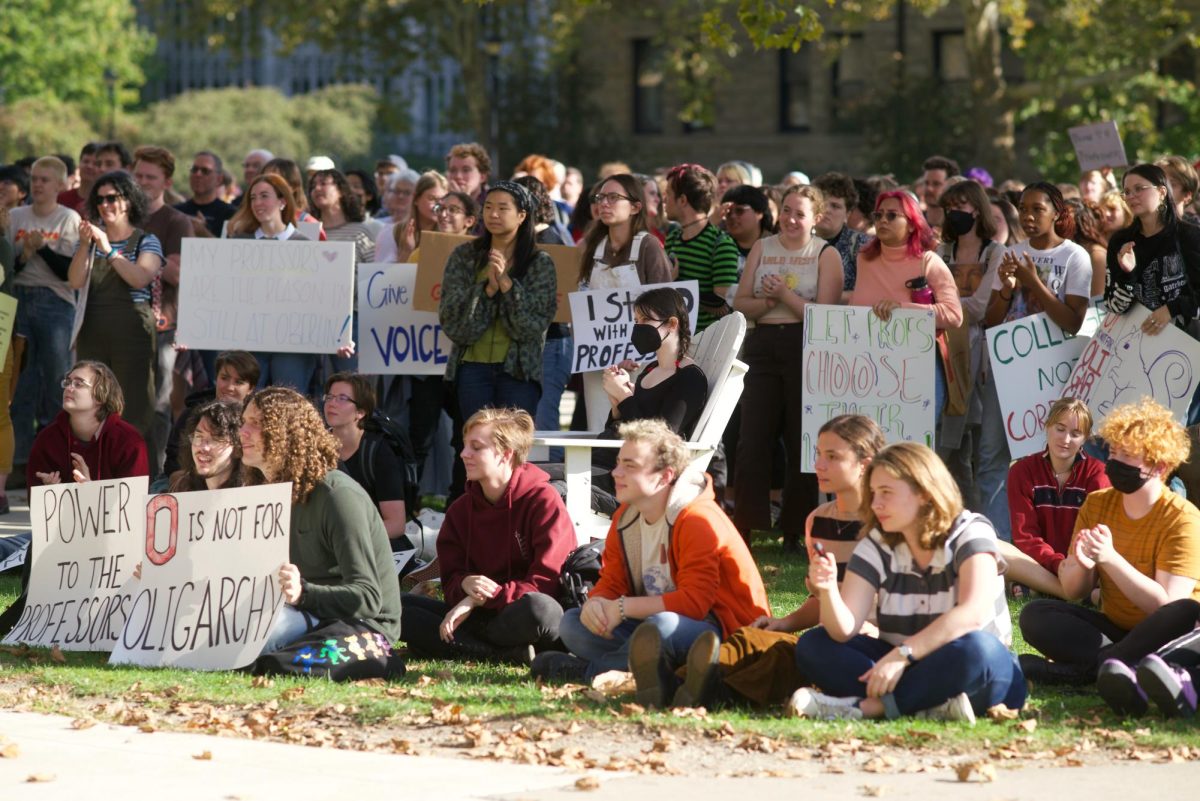On Wednesday, the General Faculty passed amendments to the Student Bill of Rights and guidelines surrounding student expression, which covers protests and demonstrations. The changes, according to the College, are meant to update the documents to reflect existing policy, but have drawn scrutiny from some members of the faculty. These policies will be used to govern student protests and will be the binding policies on all student speech and expression. The modifications to the Bill of Rights will delete sections related to financial aid and access to resources.
The revisions, which the Review has previously reported on (“College Proposes Changes to Policy on Student Protests, Demonstrations,” The Oberlin Review, Oct. 4, 2024), were proposed to the General Faculty in their September meeting. At that meeting, the faculty voted to postpone the final vote on the amendments to this Wednesday’s meeting. In the two months between the two meetings, the College held listening sessions and made changes to the amendments that were originally proposed.
The biggest changes between the original proposal and version passed on Wednesday came in the protest policies, which are titled “Guidelines For Protests, Demonstrations, And Meetings Involving Speakers, Films, And Other Forms Of Artistic Expression.” Most significantly, the original amendment had required that student organizations “must reserve a room or space when holding a meeting or protest.” The newer amendments replace the word “must” with the word “should.”
All other changes that were originally proposed passed without any significant changes. This includes the restriction on loud noise during protests, the requirement of all literature and signage to comply with the Oberlin posting policy, and new guidelines surrounding the bringing of speakers onto campus.
The Student Bill of Rights also underwent significant changes.
One of the changes proposed by both older and newer amendments is deleting part of the original document. This part details the College’s obligation to attempt to provide all demonstrated need-based aid, the obligation to provide leaves of absence, and the rights of students to attend College functions and make use of all facilities and resources.
Professor of English DeSales Harrison, who serves as the presiding officer of the General Faculty, noted that the College told faculty that the reason for the deletion of that section from the Bill of Rights is that the College’s financial aid obligations are listed in other policies instituted by the school, making it unnecessary to have the section in the Bill of Rights.
Both the older and newer amendments to the Student Bill of Rights also now stipulate that campus publications must adhere to “campus policy and local, state, and federal laws.”
Additionally, the latest amendments have changed the policies around student organizations having to report their membership. The unamended Bill of Rights stated that organizations are not required to submit a membership list to the College. Now, the document states that “Generally, the office also requests but does not require membership lists.”
According to Associate Dean of Students Thom Julian, the other changes made to the policy were grammatical and readability updates.
Both policies passed by a considerable margin, according to Professor of Politics Steve Crowley.
At the General Faculty Meeting, professors were also able to raise concerns and provide feedback about the revisions.
During the Nov. 20 meeting, another change was proposed by a faculty member regarding the requirement of students to surrender IDs, according to Harrison. The protest policies state, even prior to the amendments, that students must surrender their ID if asked by appropriate College personnel. The faculty member raised the concern that the wording might seem to imply that students must hand over their governmentally issued ID, which undocumented students might not have. According to Harrison, the concern raised historical examples of people being forced to reveal their papers before being arrested and deported. The wording was, therefore, changed to stipulate that students only need to show their Oberlin ID.
Crowley and Harrison were among those professors who raised concerns in the meeting.
“I said it was important to note that the College had somehow gotten by for close to 200 years without explicit regulations (or ‘guidelines,’ as the document puts it) on protests and demonstrations, and that the discussion should acknowledge the context in which this was happening, namely the widespread campus protests over the war in Gaza and the clampdown against them,” Crowley wrote in an email to the Review.
He did, however, note that the revised guidelines did not appear to be “particularly onerous.”
According to Crowley, one of his colleagues did not vote for the amendments as he felt students did not know about the proposed changes. The professor noted that no student in his class knew about the amendments. The College responded to his concerns by pointing out that the Student Senate was involved in the process.
Harrison said that he did not vote for the changes to the Student Bill of Rights due to the deletion of portions guaranteeing that the College will try to provide financial aid.
“I thought that the removal of … the right to financial access was a deal killer,” Harrison said. “I can’t sign on to an active exclusion of that sort.”
Julian wrote in an email to the Review that the policies will be implemented for the spring semester.
“Our plan is to officially update policies for the spring semester,” Julian wrote. “They will be uploaded to the Student Conduct Policies webpage and sent to all students on the first day of spring classes.”









